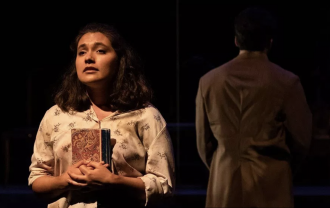Content warning: Sexual assault and violence.
As a story that spans four generations of love, family and tragedy, “The House of the Spirits” is no small endeavor for those who seek to adapt it. UC Berkeley’s Department of Theater, Dance and Performance Studies (TDPS) takes on this epic tale for the last show of its season, with the cast and crew throwing all of their efforts into tackling the sprawling familial drama.
Based on the classic book of the same name by Isabel Allende, “The House of the Spirits” was written for stage by Caridad Svich. It follows four generations of the Trueba family in Chile, mostly through the eyes of Alba (Brenda Cisneros). Alba is from the youngest generation, and is observing her family’s past in front of her as the stories of previous generations play themselves out through lens of magical realism. The TDPS production, directed by Michael Moran, premiered April 26 and will run through May 5.
By the nature of its integration of politics and family, the story is no small one. An adaptation that spans multiple generations of a complicated family and the surrounding players can be hard to follow unless it is done well. The youngest member, Alba, acts as an observer and narrator as she watches the years of the generations of her parents and grandparents lead up to her own generation. It is through Alba that the skillful direction and stage blocking that Moran brings to the production really shines through. Whether she is reacting to events from the sidelines or standing still among a group of characters dancing, Alba’s presence acts as a grounded central point for the rapid events in the script. In moments where Alba’s reaction is vital, Moran makes sure that she has the attention of the audience. In moments where the audience attention is required elsewhere, Alba remains onstage but is kept out of direct focus.
In addition to Alba, the central character who serves as a thread throughout the drama is her grandfather, Esteban Trueba (Abrar Haque), who outlives several of the other members of his family. The character of Esteban proves to be a complex one; he claims to be a devoted family man, but exhibits extremely immoral behavior. Namely, he rapes several of the women who work on his estate and shows aggressive and controlling behavior toward his wife, Clara (Abril Centurion) and daughter Blanca (Veda Baldota). As Esteban’s behavioral tendencies come in waves of affection and violence, Haque exhibits extreme control over the character. He begins as a man who is deeply in love with Clara’s sister, Rosa (Jessenia Duarte). Following her untimely death, Esteban is shocked and traumatized, exploiting the incident as an impetus for his controlling behavior as a landowner and with women. He remains violent toward other characters for several years in the story’s timeline, infuriating audience members for much of the show. He mellows out in his older years, demonstrating a genuine love for his granddaughter, Alba. This love is so visceral that it almost overshadows his past behavior, but still ultimately never redeems his character from his cruelty; it only complicates it.
One of the characters who is frequently on the receiving end of Esteban’s anger is his sister, Férula (Anna Sharpe), who is forced to stay home with their sick mother while Esteban pursues his career ambitions. Later, after their mother has passed, Férula comes to live with Esteban. Esteban has always suspected his sister of being a lesbian and torments her on this matter, oppressing her sexuality before she has a chance to explore it herself. Sharpe in the role of Férula is entirely captivating as she depicts the state of being both outwardly tormented by her brother and inwardly tormented by the identity that her society and religion have prohibited her from living.
Some performances in the cast are weaker than others — highlighting the especially strong performances from those such as Haque and Sharpe. This matter is both negative for the overall effectiveness of the ensemble cast and positive for the lead characters who shine in those frontlined roles. Overall, however, the cast’s ambitions are entirely clear — they are fully committed to doing the Trueba family story justice. The cast and crew’s passion for this story is transparent, and despite a few slips, they still hit most of the targets they aim for — making the TDPS production of “The House of the Spirits” one that is worth the watch.
Contact Nikki Munoz at nmunoz@dailycal.org.
